In the world of recreational vehicles, there comes a time when the aroma of marshmallows toasting over a campfire transforms into the crisp chill of an off-season hibernation. As much as you’d like to believe that your trusty RVs possess a magical resilience to the forces of time, the reality is that even the mightiest of batteries can fall victim to the wiles of neglect. But fear not, fellow wanderers of the open road, for you are here today to unravel the mystery that whispers through the campground: What to do with an RV battery when it’s not in use? So, embark on a journey of knowledge and discovery, as this article will uncover the secrets to saving your battery in an off-season power shutdown.
Table of Contents
RV Battery Basics
Lead Acid Batteries
When it comes to RV batteries, you’ll want to make sure that you’re taking proper care of lead-acid batteries. Lead-acid batteries are used for starting and deep cycle applications in RVs, so being aware of the best practices when caring for them is key. Here are some tips for making sure your lead acid batteries last as long as possible:
- Monitor the charging process. Make sure that you are using the right type and size of charger for your RV’s battery, and keep an eye on it while it is charging to ensure that it is not overcharging or discharging excessively.
- Pay attention to temperature when storing your batteries. Batteries should be stored in a cool, dry place and away from extreme heat or cold.
- Check the water level in your RV’s battery often, especially during hot weather. If necessary, add distilled water to keep the liquid level above the plates. Be sure to wear protective gear when doing so, as it can be dangerous if not done properly.
- Clean terminals regularly with a terminal cleaner/protector to prevent corrosion and ensure efficient power transfer.
- Use a battery conditioner or maintainer on your RV’s battery if it will not be used for an extended period of time, as this can help to prevent sulfation build-up and keep the battery in good condition.
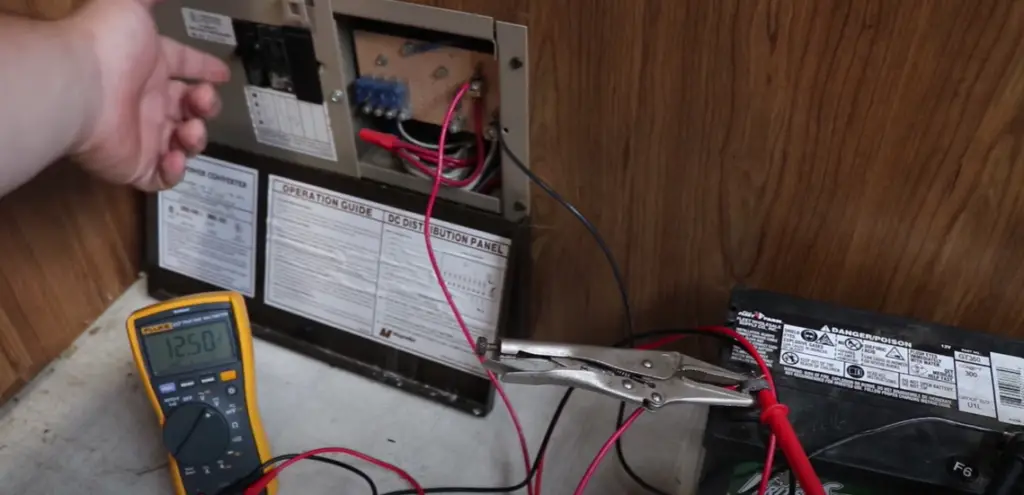
AGM Batteries
AGM (Absorbed Glass Mat) batteries are becoming increasingly popular in the RV world, as they require less maintenance and last longer than lead acid batteries. Here are some tips for properly caring for AGM batteries:
- Do not let the battery reach a deep state of discharge. AGM batteries should not be discharged below 50%, as this can cause permanent damage.
- Check the water level in the battery, as AGM batteries are maintenance-free but still need to be topped off occasionally.
- Avoid charging your AGM battery above 15 volts for extended periods, as this can lead to overcharging and reduce its lifespan.
- Make sure that you use an appropriate charger and monitor the charging process.
- AGM batteries should be stored in a cool, dry place away from extreme temperatures, and should be connected to a battery maintainer or conditioner when not in use for an extended period.
Lithium Batteries
Lithium batteries are becoming more popular in the RV industry due to their superior performance and lifespan compared to traditional lead acid or AGM batteries. Here are some tips for properly caring for lithium batteries:
- Ensure that the battery is charged with a charger specifically designed for lithium-ion batteries. Chargers designed for other types of batteries, such as lead-acid, may cause damage to the battery.
- Check the charge level of your lithium battery regularly. Lithium batteries should not be discharged below 25-30%, as this can lead to permanent damage and reduce its lifespan.
- Avoid charging your lithium battery above 4.2 volts per cell, as this can lead to overcharging and reduce its performance and lifespan.
- Lithium batteries should be stored in a cool, dry place away from extreme temperatures, and should be connected to a battery maintainer or conditioner when not in use for an extended period.
- Ensure that your RV’s charging system is suitable for lithium-ion batteries before installing them, as some systems may cause damage to the battery.
By following these tips, you’ll be able to ensure that your RV’s battery is properly cared for and will last as long as possible. Whether you’re using a lead acid, AGM or lithium battery in your RV, taking proper care of it will help ensure that you have the power you need when you’re on the road. Investing in a quality battery and taking the time to properly maintain it will save you from having to replace it prematurely [1].
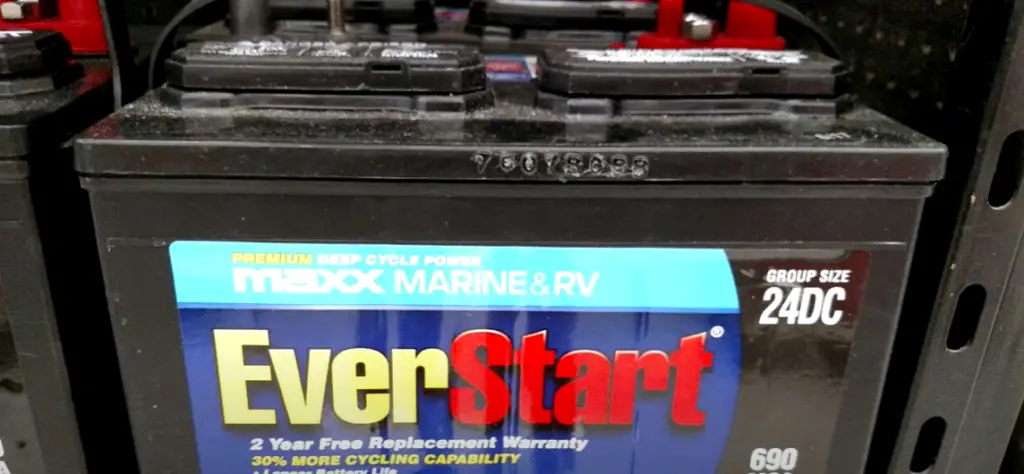
How to Protect Your Batteries While in Storage
Keep Them Charged
When the battery in your device is not being used, make sure to keep it charged. Fully charging a battery before storing it and periodically topping off the charge can help protect the cells from becoming depleted. Keeping batteries at a full charge reduces their chances of developing performance issues over time.
Ensure Proper Storage Conditions
Proper storage conditions are also important when it comes to safeguarding your batteries. It is important to find a location that does not get too hot, as extreme temperatures can cause damage to the cells and may lead to poor performance or even failure. Proper ventilation of the area is also key; storing batteries in an airtight container can be hazardous due to the buildup of gasses released from charging and discharging cycles.
Store in a Climate Controlled Place
When storing batteries for long periods, it is important to find a place that can remain climate-controlled. This will help prevent the cells from deteriorating due to extreme temperatures or humidity levels which could lead to reduced performance or failure. Additionally, make sure to keep them away from sources of direct heat and moisture such as radiators or humidifiers.
Use a Battery Kill Switch to Eliminate Parasitic Loads
A battery kill switch can help maintain the life of your battery by eliminating parasitic loads, or any power draw from sources that are not actively being used. By flipping the switch, you can ensure that any power consumption is minimized while in storage and reduce the risk of cell damage.
Regularly Check for Corrosion
When storing batteries, it is important to perform regular checks for signs of corrosion. This can be caused by long periods of inactivity, moisture buildup, and extreme temperatures. If corrosion is present, take the necessary steps to clean the terminals and make sure that any areas that may have been affected are clear before reconnecting. Taking these precautions will help keep your battery healthy and performing for years to come [2].
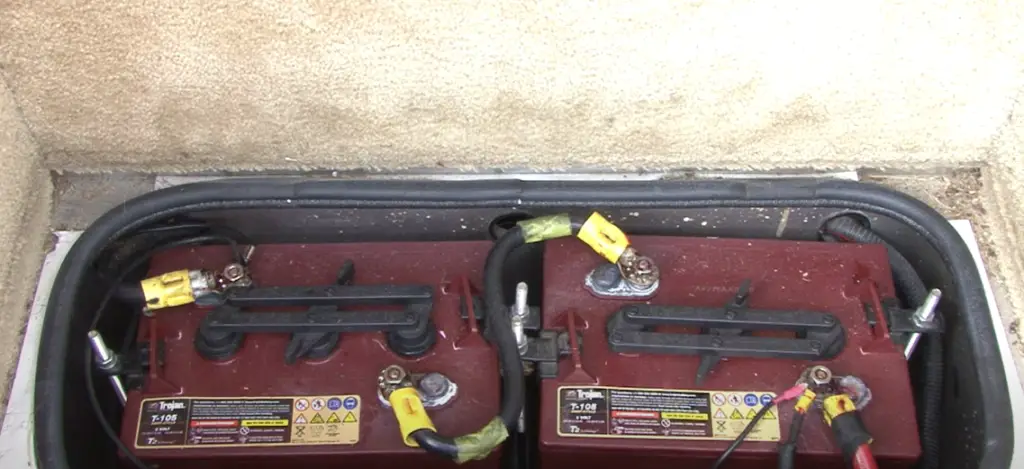
How Cold Is Too Cold for an RV Battery?
RV batteries are designed to hold up under a range of temperatures, but extreme cold can still affect their performance. If you’re venturing into colder climates, it’s important to understand how the temperature can affect your battery and what precautions you need to take.
When temperatures drop below 20°F (-7°C), any excess water in your battery will also freeze. This can cause the cells in your battery to contract and expand, which can damage the plates inside. It’s important to keep the battery clean and monitor it for any signs of cracks or leakage. If you notice these issues, you should take your RV to a qualified service center for repairs.
To protect your battery from cold weather, make sure to keep it charged at all times. You should also invest in a battery blanket or heater if you’re planning an extended trip in extremely cold climates. Not only will this help keep your battery warm, but it can also extend its life and ensure that your RV is ready when temperatures rise again.
How to Store Your RV Battery for the Winter
Remove the RV Battery from Your RV
When the camping season comes to an end and it’s time to store your RV for the winter, it is important to properly prepare it. One of the crucial steps in this process is removing the battery. By doing this before proceeding with other winterizing tasks, such as draining the water lines and adding antifreeze or removing propane, you ensure that the battery is safely stored and protected from the cold weather. Taking this extra precaution will help prolong the life of your RV’s battery and ensure that it is ready to power your adventures when the camping season returns.
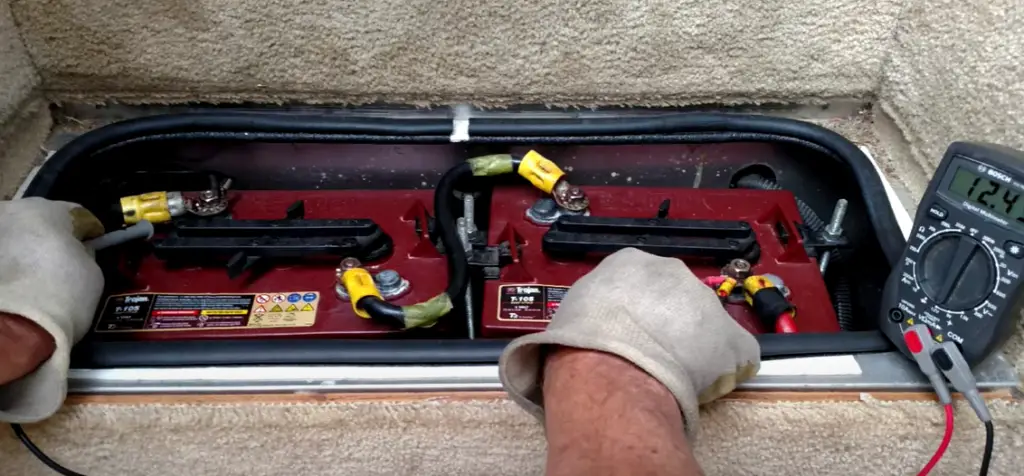
Check and Clean the Battery Terminals
Before storing your RV battery, it is important to check for any buildup of corrosion on the terminals. Corrosion can hinder the performance of the battery and lead to potential issues down the line. If you come across any corrosion, it is recommended to use a wire brush to gently clean it off, ensuring that the terminals are free from any residue. After cleaning, applying a thin layer of terminal protector can provide an additional layer of defense against future buildup, helping to maintain the battery’s longevity and performance. By taking these preventive measures, you can ensure that your RV battery remains in optimal condition for your next adventure.
Charge the Battery
Before storing your RV battery for the winter months, make sure that it is completely charged. This helps to maintain the battery’s performance and will ensure that it functions properly when you are ready to use it again. You should also take the time to charge and test any secondary batteries, such as those used for your sound system or other appliances. By doing this, you help to limit any unexpected issues that may arise upon your return in the spring.
Store the Battery in a Warm Location
When the time comes to store your RV battery, it must be stored in a warm location. Cold temperatures can cause damage to the battery, meaning that you should avoid storing it outdoors or in any other cold area. Instead, look for an indoor storage space such as a garage or shed and keep the battery at room temperature if possible. If outdoor storage is the only option, make sure to place it in an insulated box or bag and protect it from exposure to moisture.
Check on Your Battery Regularly
Proper storage helps protect your RV battery against damage during the winter months, it’s important to do regular checkups. Doing so can help you detect any issues that may have developed during the storage period, allowing you to address them before any major damage occurs. During checkups, it is important to look out for signs of corrosion or other damage and take the necessary steps to ensure that your battery remains in good condition [3].
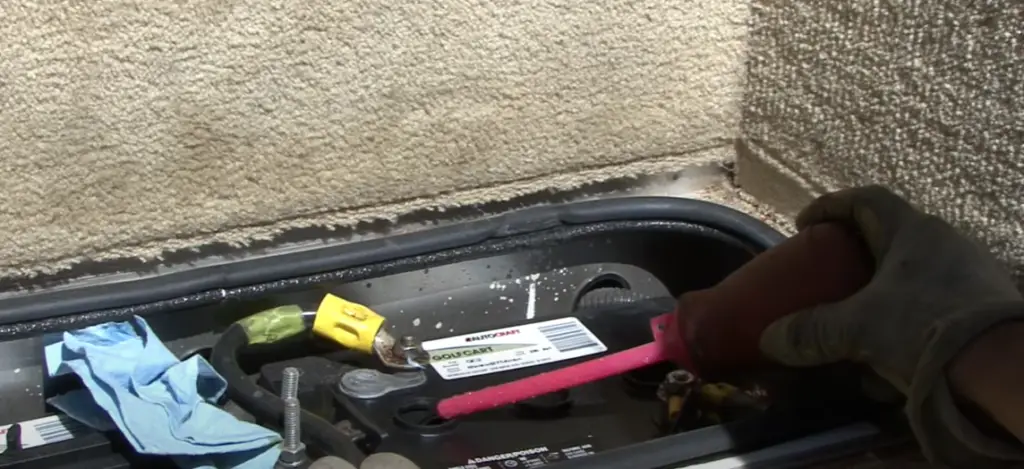
FAQ
How do you store an RV battery when not in use?
When storing an RV battery, it is important to keep it in a dry and cool place. Make sure that the terminals are tightly secured and that all power sources are disconnected from the battery. It is also recommended to check your battery levels every few months while it is in storage to ensure that the cells remain charged. Additionally, when not using a battery for extended periods of time, it is important to fill the cells with distilled water and recharge the battery every one to two months. This will ensure that your RV battery lasts longer and is ready for use when you need it.
What are some tips for extending RV battery life?
To extend the life of your RV battery, make sure that you charge it regularly and keep it topped up with distilled water. Additionally, avoid deep discharging your battery as this could lead to permanent damage or shortened battery life. It is also important to keep the terminals clean and free of corrosion so that they remain securely connected and power can flow properly through the battery. Finally, you should always store your RV battery in a dry place away from extreme temperatures for optimal performance.
How often should I replace my RV battery?
The life of your RV battery will depend on several factors, including how often you use it and how well you take care of it. Generally speaking, the average lifespan of an RV battery is between three to four years with proper maintenance and regular charging. However, if your battery is showing signs of wear or if it has been in storage for a long period, you may need to replace it sooner. If your battery is no longer holding a charge or if the cells are corroded, then it’s time for an upgrade.
What type of RV battery should I get?
The type of RV battery you choose will depend on the type of recreational vehicle you have and your personal needs. Lead-acid batteries are a popular choice as they are widely available and offer good value for money, but they require regular maintenance and can be heavy to carry. Another option is lithium-ion batteries, which are lightweight, last longer than lead-acid models, and don’t need as much maintenance. Ultimately, it’s up to you to decide which type of battery best suits your needs.
What should I avoid when using my RV battery?
When using an RV battery, it is important to avoid deep discharging it or leaving it sitting idle for long periods without a charge. Additionally, you should not connect different types of batteries in parallel and you should never attempt to jump-start a dead RV battery as this can cause serious damage. Finally, it is important to avoid placing the battery near any sources of heat as this can significantly reduce its lifespan. Taking these simple precautions will ensure that your RV battery lasts for many years.
Should you disconnect the RV battery when not in use?
Yes, it is highly recommended to disconnect your RV battery when not in use. This will protect the battery from any power surges and can help prevent accidental short-circuiting or damage caused by overcharging. It is also important to disconnect any other electrical sources such as solar panels or chargers before you store your RV battery for extended periods. Taking these steps will help extend the life of your RV battery and ensure that it is ready for use whenever you need it.
What drains the RV battery when not in use?
When an RV battery is not in use, several factors can contribute to the drain. These include an incorrect connection, voltage leakages, or parasitic current draw from sources such as solar panels or chargers. Additionally, if your battery has been sitting idle for long periods without a charge it can cause the cells to slowly deplete and reduce its lifespan. To avoid these issues, it is important to disconnect the battery when not in use and ensure that all power sources are securely connected before you start your RV.
What should you do if an RV battery dies?
If your RV battery has died, you should take a few precautionary steps before attempting to jump-start it. First, make sure that all power sources are disconnected, including solar panels and other chargers. Then, check the terminals for any corrosion or damage and clean them if necessary. After this is done, it should be safe to jump-start your battery with a working RV battery. Be sure to follow the instructions for jump-starting carefully, as incorrect connections can cause serious damage to both batteries. Once the jump-start is successful, it is important to keep your battery topped up with distilled water and recharge it regularly. This will help ensure that your RV battery remains in top condition and lasts for many years.
Useful Video: RV Battery Disconnect Switch – What it Does and When to Use it
Conclusion Paragraph
If your RV battery is not in use for a long period, it is recommended to perform periodic maintenance on it. You should charge the battery and check the terminals for corrosion, ensuring they are properly connected. Additionally, you should keep your battery clean and store it in a cool dry place. Follow these simple guidelines and your RV battery will stay in good condition over time.
Regularly checking up on your battery and performing preventive maintenance is the best way to extend its lifetime. Setting up a regular schedule for charging, cleaning and storage will help you get the most out of your RV battery. With proper care, you can rely on your RV battery for many years to come!
References:
- https://www.rvrepairclub.com/article/rv-battery-basics-beginners-guide/
- https://www.bebat.be/en/blog/stock-batteries-safely-at-home
- https://blog.campersinn.com/blog/rv-battery-winter-care






Leave a Reply